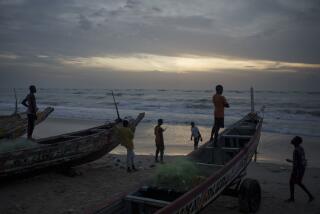Deaths of Haitians Repeats Tragic Theme
- Share via
MIAMI — The long list of Caribbean migrants who have perished at sea while trying to reach Florida grew by at least 36 on Sunday as the U.S. Coast Guard abandoned the search for survivors from two boatloads of Haitians that sank in the Gulf Stream.
Three men were rescued early Saturday and two bodies were recovered after the small, overloaded fishing vessels went down about 30 miles east of Palm Beach. Survivors told U.S. Border Patrol officers that about 40 people boarded the boats, piloted by smugglers, on Grand Bahama Island.
“Clearly, this tragedy points up the dangers of illegal immigration and smuggling ventures,” said Coast Guard Lt. Cmdr. Marc Woodring. “For years we have repeated this warning to both Haitians and Cubans considering this trip.”
But they keep coming. The Coast Guard intercepted 1,025 Cubans and 1,206 Haitians at sea in 1998, more than doubling the 1997 total. Those figures do not reflect the unknown numbers of immigrants who reach shore illegally, or those who disappear at sea.
With the economies of Haiti and Cuba in turmoil, the trend of increased migration from the two nations is expected to continue, U.S. officials said. Florida Gov. Jeb Bush was expected to address the problem in a visit to Miami today.
In recent months, organized smuggling rings, which operate speed boats or fishing vessels and charge several thousand dollars a head, have been ferrying Cubans and Haitians into south Florida from the Bahamas, according to the Border Patrol. Those operations have largely replaced the larger migrations of previous years in which Cubans set out on inner-tube rafts and Haitians piled into wooden sailboats.
During the 1980s, many lives were lost during failed crossings. The dead were remembered in church services throughout south Florida on Sunday, and the tragedy was the talk of the Haitian community. “We are shocked and saddened by this,” said community activist Marleine Bastien.
“Every time there is an incident like this, we are concerned,” added Jan Mapou, a bookstore owner in Miami’s Little Haiti. “This is a crime. But as things get worse and worse in Haiti, with the political situation and the economy, people will keep coming.”
In December, as many as 14 Cubans drowned when a 29-foot boat overturned in heavy seas about 20 miles south of Miami. Nine people survived, including two who were charged with masterminding the trip. One man pleaded guilty last week to a charge of conspiracy to smuggle immigrants, and the other is to be tried for manslaughter.
In the latest accident, the crew of a passing freighter heard screams in the early morning darkness Saturday. It was unable to locate anyone in the water.
But the crew of a Coast Guard helicopter equipped with night-vision goggles spotted two men clinging to a barrel. One was rescued, but the other slipped beneath the surface. A second helicopter crew found two other survivors after daybreak Saturday.
One of the three men rescued told Border Patrol agents that a 17-foot boat with 18 people aboard broke down and that the other, a 20-footer carrying 18 to 25 more Haitians, came to help. Both boats then sank.
“Each boat was grossly overloaded, over twice the legal number,” said Coast Guard Petty Officer Jeff Hall. “The average 17-foot boat should carry no more than eight or nine people.”
None of the Haitians were wearing life jackets, Hall said.
The two bodies pulled from the water were taken aboard the Coast Guard cutter Matagorda, which hours earlier had plucked seven Cubans from a sinking boat near Biscayne Bay. The search for others on board continued until early Sunday, covering a 2,600-square-mile area that extended as far north as Fort Pierce.
More to Read
Sign up for Essential California
The most important California stories and recommendations in your inbox every morning.
You may occasionally receive promotional content from the Los Angeles Times.












